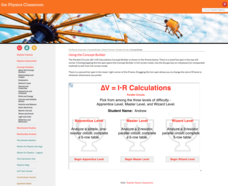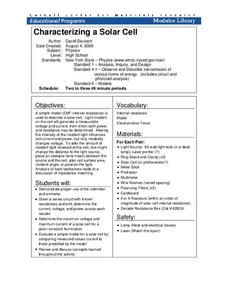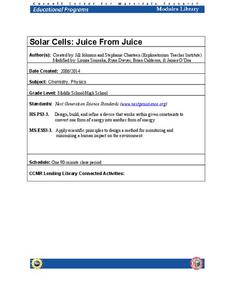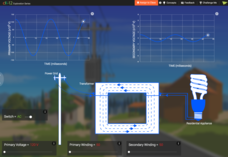Bonneville
Solar Panel Basics
Going outside is a logical step when dealing with solar panels. Future scientists learn about the n-type and p-type layers of solar cells in the third of 14 lessons in the Cost Effective Solar Cells unit. They go outside to model the...
Bonneville
Engaging with Solar Panels
Build a fan and become a fan of solar power. The second of 14 lessons in the Cost Effective Solar Cells unit has learners first construct circuits with solar cells to power a fan, a motor, and an LED. They then test their circuits both...
Teach Engineering
Powering a Device Using Food
Eat up a resource on using food to power electrical devices. Future engineers first experiment with different fruits and vegetables to determine the amount of electrical energy they provide. Based on the data, they design and create an...
Magic of Physics
Unit Converter I
Talk about a cool tool! Convert between units with the click of a mouse using a handy online resource. Enter the starting measurement and units for quantities such as torque, speed, and inertia, then sit back and relax while the computer...
Physics Classroom
Parallel Circuits - ∆V = I•R Calculations
Parallel circuits often provide less of a challenge for teens than parallel parking. An installment of a series on parallel electric circuits requires learners to solve increasingly difficult levels of calculations. Each level...
Physics Classroom
Series Circuits: ∆V=I•R Calculations
Better than some television series, parallel series circuits provide practice for calculations. Scholars work through a series of problems, each progressively more difficult. They apply knowledge of voltage calculations, resistors, and...
Physics Classroom
Ohm's Law: Voltage-Current-Resistance Relationship
Join the resistance—Ohm! Scholars apply Ohm's Law to problems of increasing difficulty as part of a series on electric circuits. The lesson begins with simply doubling and tripling voltage or resistance. It ends with having pupils solve...
Physics Classroom
Know Your Potential
Never underestimate potential—electric or your own. Scholars apply a color scheme based on the changes in electric potential as part of a series on electric circuits. They consider splitting wires, light bulb placement, and voltage as...
Physics Classroom
Resistance Ranking Tasks
Resistance is not futile ... it is voltage divided by current. Scholars apply their knowledge to a series of ranking puzzles. First, they consider wires of varying lengths and then wires of varying cross-sectional areas. Finally, they...
Cornell University
Characterizing a Solar Cell
Young classes are sure to get a charge out of this lesson! Learners experiment with circuits of a solar cell. They practice determining current, voltage, and power for the circuit and maximize the voltage and current of the cell.
Cornell University
Splitting Water with Electricity
Explore how electricity splits water molecules into hydrogen and oxygen. Learners begin by calculating the voltage necessary to separate the water. They then perform the experiment and measure the ratio of hydrogen and oxygen bubbles.
Cornell University
Solar Cells: Juice From Juice
Unleash the power of ... blackberries! Science superstars create solar cells using the juice of berries or leaves of a citrus tree in an engaging lab. In addition to offering a plethora of resources, the teacher's guide gives background...
Concord Consortium
Crooke's Tube
Behold, the electron is discovered! Take young scientists on a journey back through time to examine JJ Thompson's famous experiment using a Crooke's tube. Pupils manipulate the charge on the apparatus' horizontal plates, observe cathode...
Cornell University
Making a Battery
Don't be shocked when your class has a blast making their own batteries! Science scholars examine a dry cell battery, then design and construct a wet cell battery. The activity guides them through the parts of a battery, the variables...
CK-12 Foundation
AC Transformer
High voltage power lines deliver electricity to homes, but each home requires low voltage. How does the energy get converted so it can be used safely? Pupils explore alternating current and transformers through a simulation. They control...
CK-12 Foundation
Electric Analogies
We can see the result of electricity but not the process itself. The simulation compares electric circuits to a water tower and water wheel cycle. Young scientists adjust the height of the tower, the amount of resistance, and if...
CK-12 Foundation
Telegraph
Most pupils don't know what a telegraph is, much less how one works. A secret simulation has scholars pick the size of the primary and secondary loops, the battery voltage, and which letters in the Morse Code they want to transmit. They...
CK-12 Foundation
Power Lines
How does electricity travel through power lines? The simulation demonstrates the how changes in voltage and resistance are related to the distance between power polls and the thickness of the cable. Scholars control three variables in...
Columbus City Schools
It’s Electric!
Shocking! Who knew so many great ideas existed for teaching middle schoolers about electricity? Find them all within this energetic framework. You'll light up at the variety of printable and web-based resources within! After building...
LABScI
Circuits Lab: Lightbulbs
Electrons flow from negative to positive, but the general consensus is that current flows from positive to negative. Scholars explore current through construction of circuits in both series and parallel. The focus is on voltage,...
Bowels Physics
Electric Circuits
Investigate the construction of the electric circuit with a thorough presentation that provides a solid background for each type of circuit. After introducing key vocabulary, the lesson goes on to explain circuit design.
Chymist
Batteries
Young scientists study the construction of a battery through experimentation. They engage in five experiments which combine to create a thorough study of the history of batteries beginning with a model of the first battery.
Virginia Department of Education
Complex Numbers
Build on your class' understanding of real numbers as they begin working with complex numbers. Pupils begin with an exploration of i and the patterns in the powers of i. After developing a definition for i, they...
PHET
Capacitor Lab
The first capacitor was a Leyden jar, invented in 1745. Physics scholars explore capacitors in an engaging simulation. They may view one or set up circuits which contain two to three either in series or parallel. Other views include...
























